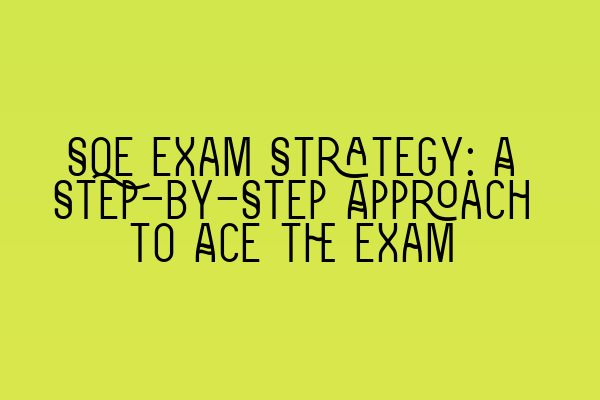SQE Exam Strategy: A Step-by-Step Approach to Ace the Exam
Preparing for the SQE exam can be a daunting task. With its comprehensive syllabus and rigorous testing format, it is crucial to have a well-planned approach to maximize your chances of success. In this article, we will walk you through a step-by-step strategy that will help you ace the SQE exam.
Step 1: Understand the Exam Structure
Before diving into your preparation, it is essential to familiarize yourself with the exam structure. The SQE exam consists of two stages: SQE1 and SQE2.
SQE1 focuses on testing your critical thinking and problem-solving skills through multiple-choice questions and written tasks. It covers topics such as legal research, legal writing, dispute resolution, and client interviewing.
SQE2, on the other hand, assesses your practical legal skills through different legal practice areas. These areas may include property law, criminal law, contract law, and more.
By understanding the exam structure, you can allocate your time and resources effectively and tailor your preparation accordingly.
Step 2: Create a Study Plan
Now that you have a clear understanding of the exam structure, the next step is to create a study plan. A well-designed study plan will help you stay organized, focused, and cover all the necessary topics.
Start by breaking down the syllabus into manageable chunks and allocate specific time slots for each topic. Be realistic with your study goals and consider your other commitments and obligations.
It is also beneficial to incorporate practice questions and mock exams into your study plan. This will not only help you assess your knowledge but also familiarize yourself with the exam format and improve your time management skills.
Step 3: Seek Professional Guidance
Preparing for the SQE exam can be overwhelming, and sometimes it’s wise to seek professional guidance. Engage with experienced solicitors or SQE training providers who can provide valuable insights and resources.
Consider attending workshops or training sessions that focus on specific legal practice areas relevant to SQE2. These interactive learning experiences can help deepen your understanding and provide practical insights into the application of legal principles.
Additionally, reading articles and resources related to SQE exam topics can further enhance your knowledge. Some recommended articles include:
- Tenant Rights in the UK: Understanding Your Legal Protections
- Examining the Intricacies of Land Law in the UK
- Legal Considerations in Residential Leases: Essential Insights for Solicitors
- Workshops on Land Law: Interactive Learning for Aspiring Property Law Professionals
- Lease Laws in the UK: Unraveling the Legal Framework for Tenants
These articles provide valuable insights and tips that can contribute to your exam preparation and improve your understanding of the relevant legal concepts.
Step 4: Practice, Practice, Practice
Practice is the key to success in the SQE exam. Regularly practicing mock exams and sample questions can help you become familiar with the exam format and hone your problem-solving skills.
Allocate dedicated time to practice each question type, such as multiple-choice questions, written tasks, and practical case scenarios. This will help you build speed, accuracy, and confidence in tackling different types of questions.
Remember to review and analyze your performance after each practice session. Identify your strengths and weaknesses and focus on improving areas where you may be struggling. Consider seeking feedback from professionals or joining study groups to gain different perspectives.
Step 5: Prioritize Your Mental and Physical Well-being
While it’s crucial to dedicate time to your exam preparation, it’s equally important to prioritize your mental and physical well-being. Neglecting self-care can lead to burnout and hamper your performance in the exam.
Make sure to incorporate breaks, exercise, and relaxation activities into your study routine. Maintain a balanced diet and get enough sleep to keep your mind and body in optimal condition.
Additionally, don’t hesitate to reach out for support from friends, family, or mentors during your preparation. Discussing your concerns or sharing your achievements can provide emotional support and motivation throughout the journey.
Conclusion
Preparing for the SQE exam requires a systematic approach, dedicated effort, and a well-structured study plan. By understanding the exam structure, seeking professional guidance, practicing regularly, and prioritizing your well-being, you can increase your chances of acing the SQE exam.
Remember, the key to success lies in consistent and focused preparation. Start early, stay organized, and believe in your abilities. Good luck!

Leave a Reply